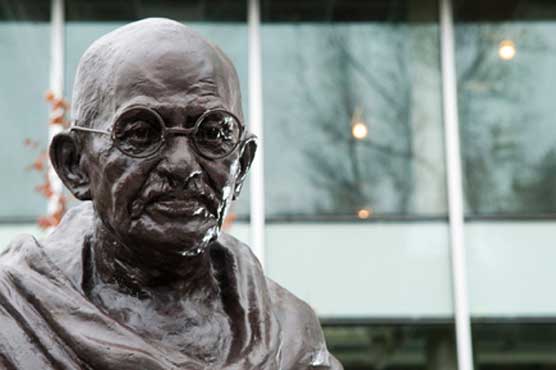Mahatma Gandhi to stand with foes at British parliament

Britain would "honour his memory" with a statue in Parliament Square, says George Osborne.
NEW DELHI (AFP) - Mahatma Gandhi, who led efforts to end British rule in India and was repeatedly imprisoned, is to be honoured with a statue outside Britain s parliament that will stand alongside tributes to several colonial-era enemies.
British finance minister George Osborne, on a trip to New Delhi to meet the new government of Narendra Modi, wrote on Twitter that Britain would "honour his memory" with a statue in Parliament Square.
India s independence hero will rub shoulders with his one-time nemesis, British wartime prime minister Winston Churchill, who once said he hoped Gandhi would die from fasting and famously derided him as a "half-naked fakir".
The Gandhi statue will also stand alongside one of Jan Smuts, a leader of South Africa in the early 20th century who favoured racial segregation.
Gandhi was jailed by Smuts s government for campaigning for the rights of downtrodden Indians, a forerunner to his more famous non-violent campaign at home that would strike fear into successive British governments until independence in 1947.
"I hope this new memorial will be a lasting and fitting tribute to his memory in Britain, and a permanent monument to our friendship with India," Osborne said in a statement.
Parliament Square is opposite the Palace of Westminster which houses the British legislature and contains statues of statesmen and other historical figures, including South Africa s Nelson Mandela.
Osborne and Foreign Secretary William Hague were meeting Modi later Tuesday to push for trade and access for British companies to the Indian market.
Hague, who visited a memorial to Gandhi in New Delhi on Tuesday, described him as a "towering inspiration and a source of strength".
Hague later met his Indian counterpart Sushma Swaraj.
"The (EMA) external affairs minister began (the meeting) by thanking them for this gracious gift," said foreign ministry spokesman Syed Akbaruddin.
The Gandhi statue fits a pattern of Britain reviving -- and appearing to atone for -- its colonial past in India during visits by senior figures.
In February last year Prime Minister David Cameron visited the site of a 1919 massacre in which troops under British control gunned down hundreds of unarmed protesters.
He described the massacre at Jallianwala Bagh in the city of Amritsar as "shameful" but stopped short of a public apology.
Reaction to the news of the Gandhi statue was mixed.
Commentator and marketing executive Suhel Seth wrote on Twitter that "with this announcement you ll win the hearts of every Indian (and) also help those all over the world be inspired".
Journalist Kabir Taneja joked that "Churchill s statue may develop a frown when Gandhi s statue is placed alongside him".
European governments including Britain and the United States boycotted Modi for a decade over deadly religious riots in 2002 while he was running his home state of Gujarat.
But they are now trying to make up for lost time following his election triumph in May, with Russia s deputy prime minister, the French foreign minister and US Senator John McCain all visiting in recent weeks.

